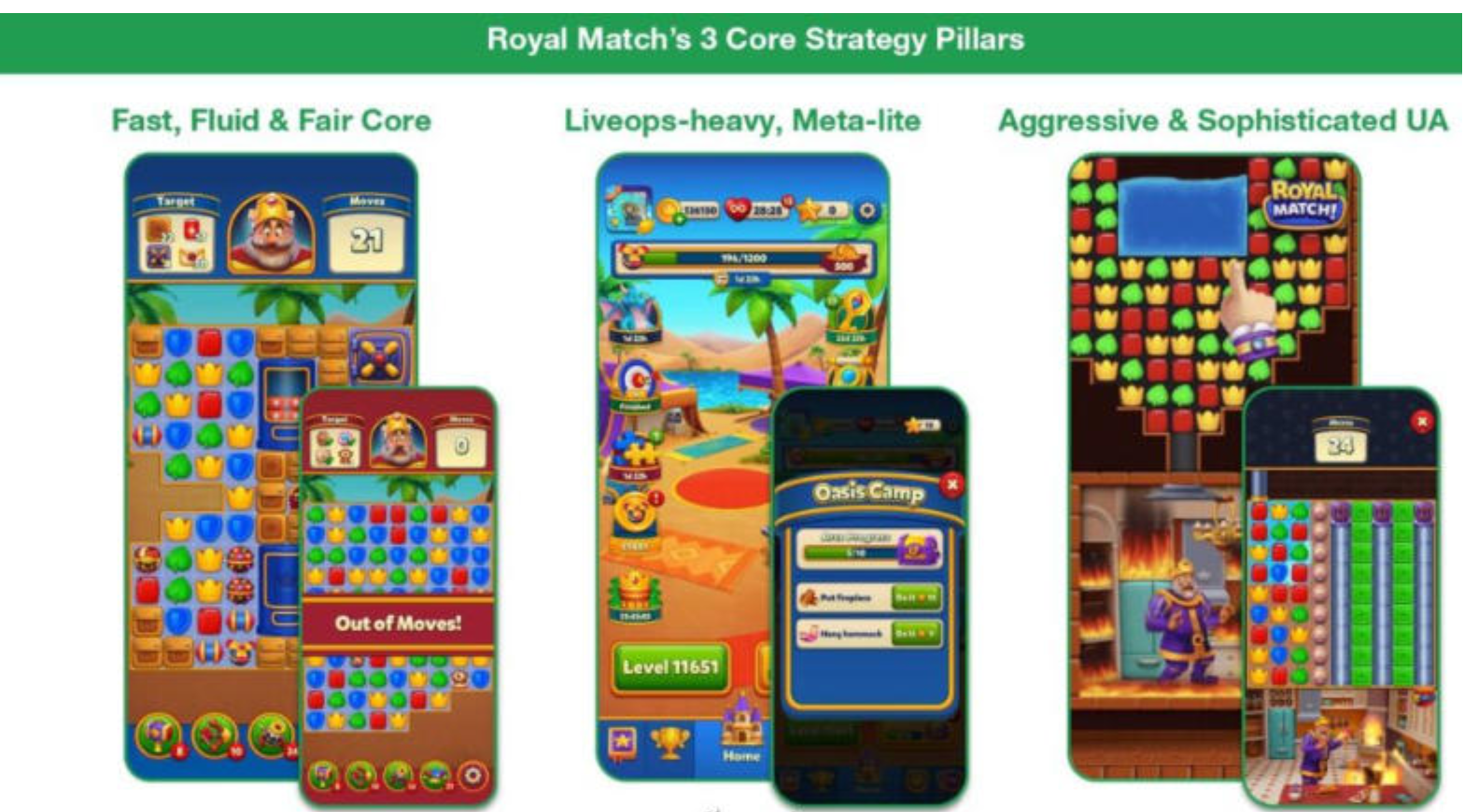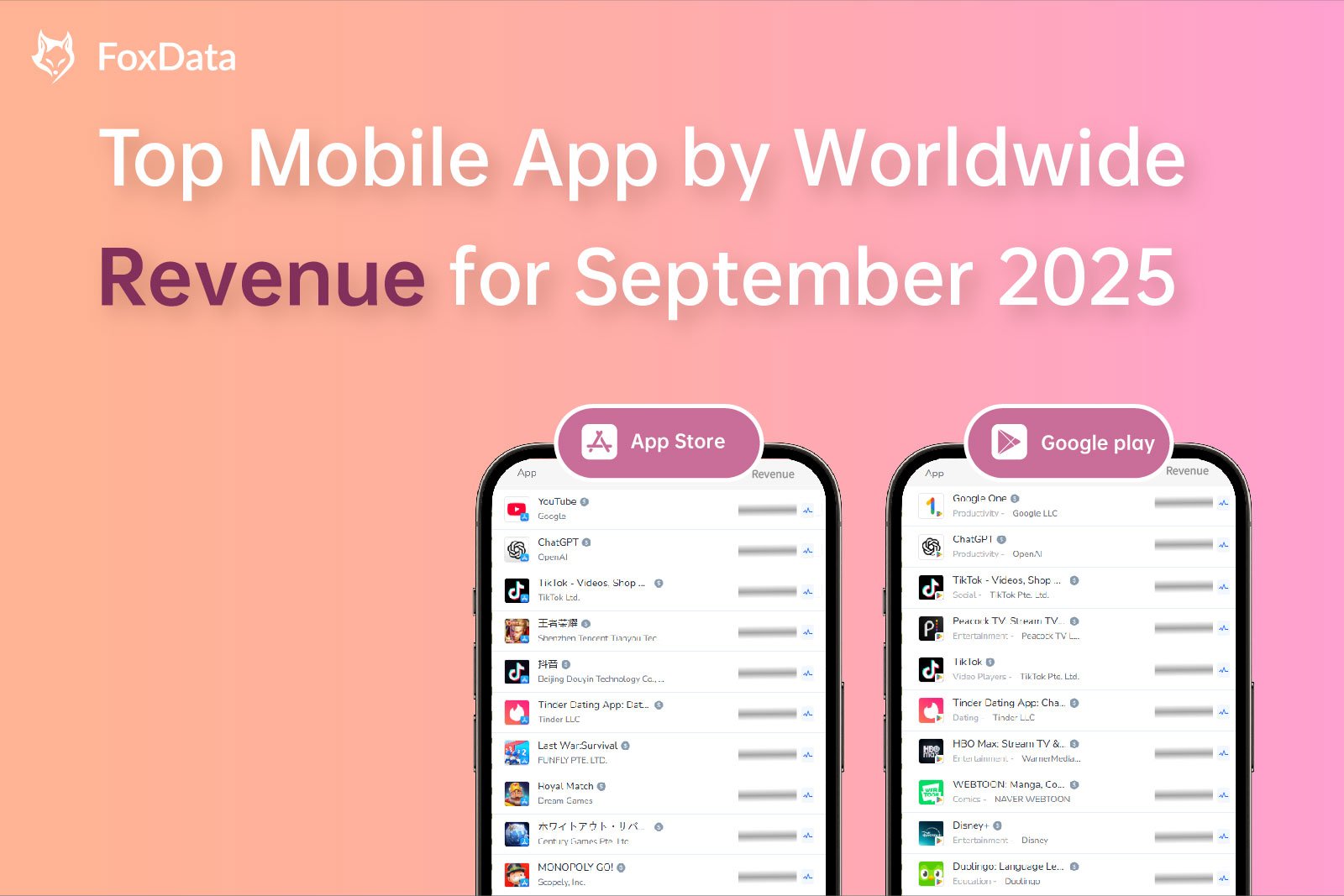Games Redefined Match-3 with Flawless Execution and Smart UA

The match-3 puzzle genre may appear simple, but breaking into the top tier is one of the toughest challenges in mobile gaming. For nearly a decade, the space was dominated by King’s Candy Crush and Playrix’s Homescapes/Gardenscapes series. But since the release of Royal Match by Turkey’s Dream Games in 2021, the landscape has been fundamentally reshaped.
In just a few years, the game has generated over $4 billion in cumulative revenue and attracted more than 55 million monthly active users (MAU), while consistently holding the top spots in global grossing charts. Its sequel, Royal Kingdom, has also entered the top five within the subcategory.
This meteoric success was no accident. Dream Games has demonstrated what we might call “100% execution”. The formula wasn’t disruptive innovation—it was unrelenting polish of core gameplay, a lightweight meta layer, and razor-sharp ad and monetization optimization.
Core Gameplay: 100% Polish in Flow and Fairness
Dream Games' edge lies in pushing every mechanic of match-3 to perfection:
- Speed & Smoothness: Animations are short and crisp, with no wasted delays, making each session faster and more satisfying.
- Player Autonomy: When no moves remain, the board reshuffles for free—never forcing item consumption, a stark contrast to competitors.
- Smarter Power-Ups: Tools like the propeller auto-target high-value tiles, while combo effects concentrate fire on obstacles instead of being wasted.
- Fair Mechanics: On the last move, closed obstacles automatically switch into a destroyable state, preventing “forced losses” and ensuring players feel in control of failure.

Individually, these details appear minor. Combined, they create a seamless and trustworthy play experience that competitors struggle to fully replicate. Many reach 80% execution, but Dream Games delivers 100% polish—a difference that defines success at the top.
A Light weight Meta to Keep the Focus on Match-3
Unlike Playrix, which leans heavily on story-driven narratives and complex deco systems, Royal Match employs a streamlined progression model:
- Players collect stars from levels to unlock simple decorative tasks.
- Decoration serves as background progress, not the core loop.
- This light design lowers cognitive load for casual players, keeping full attention on the puzzle gameplay.
FoxData’s internal data shows that this lightweight meta delivers stronger long-term retention because players aren’t distracted by heavy “meta management.”
Monetization: Mastering the Psychology of the “Near Miss”
Dream Games relies entirely on in-app purchases without forcing ads, strengthening player goodwill. Its monetization centers on the “Near Miss” effect:
- Levels are designed so players often fail by just 1–2 moves.
- In those moments, extra moves feel immensely valuable.
- The second continue option adds not just moves, but also a strategically placed rocket, ensuring that a purchase feels impactful, never wasted.

This balance between fairness and nudged frustration maximizes conversion without alienating players, creating both complaint and loyalty—a paradox only achieved with precise, iterative tuning.
User Acquisition: A Funnel Built on Trust
Another key to Dream Games’ success lies in authentic ad strategy. Unlike competitors who mislead with irrelevant mini-games, Royal Match delivers on its marketing promises:
- Its signature “Save the King” ads appear directly in-game as special levels.
- No “bait-and-switch” mechanics, reinforcing trust and retention.
- According to FoxData data, 50–60% of downloads come from paid UA, significantly higher than most match-3 rivals.
🔎 This is exactly where FoxData’s Ad Intelligence empowers developers:
- Discover top-performing ad creatives across competitors.
- Monitor keyword trends and app rankings to identify market shifts.
- Analyze developer and advertiser leaderboards to understand spend scale and ad channel distribution.
👉 For example: by studying Dream Games’ strategy via FoxData Ad Intelligence, studios can quickly spot high-converting creatives, uncover core UA markets, and refine regional targeting strategies, ultimately improving UA efficiency and ROI.
Why Competitors Struggle to Replicate It
The formula is clear—but execution is brutally difficult:
- Core gameplay precision – even tiny flaws in speed or item logic lead to a dramatically worse experience.
- Meta requires foundation – lightweight systems only work if the core loop is polished enough to keep players engaged.
- Monetization tuning – balancing fairness and purchase triggers demands years of large-scale data.
- UA capital and discipline – few studios can sustain the massive, iterative ad spend Dream Games executes.
Industry Takeaways for Developers
Dream Games teaches us that even in saturated markets:
- Polish beats novelty: Outstanding execution outperforms risky innovation.
- Trust is currency: Early generosity lays the foundation for monetization later.
- Ads must align with product: Trust-based funnels convert better long-term.
- Data-driven iteration wins: From level balancing to ad testing, decisions anchored in data drive compounding success.
💡 With FoxData’s full-stack platform, developers can:
- Run user behavior analysis to optimize retention by segment.
- Use Ad Intelligence to track competitor UA strategy and creatives.
- Apply Keyword Intelligence to refine ASO and search visibility.
- Monitor Trending & Ranking tools to spot market opportunities early.
Conclusion
Royal Match proves that even the most entrenched markets can be disrupted—not through flashy innovation, but through flawless execution, data-driven monetization, and authentic advertising.
But replicating this success demands 100% polish at every level. Competitors at 80–90% rarely stand a chance.
For developers aspiring to global scale, gut instinct alone won’t cut it. Strategic use of player psychology, rigorous data analysis, and precise ad intelligence is the only way forward.
👉 With FoxData and its Ad Intelligence, you can build the same closed-loop system Dream Games did: gameplay + UA + data iteration—and carve your advantage in the global mobile gaming market.






